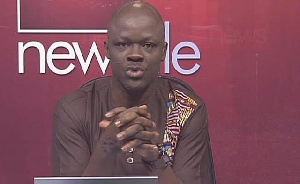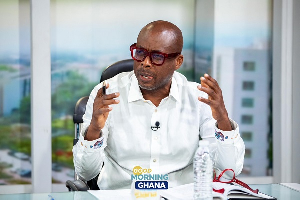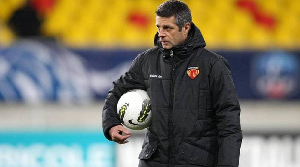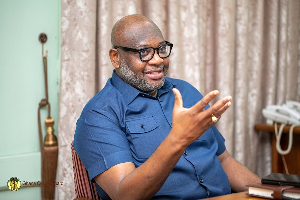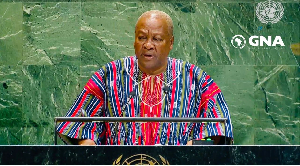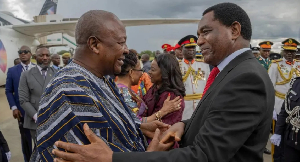A “YES” vote on December 17, 2019, does not make elective what already is elective. What it does, in fact, is to make legal what the Constitution prohibits. The law is that political parties are prohibited from sponsoring candidates for elections at the district assembly and lower local government units. This position was very important to the framers of the Constitution so they locked it down in Article 290 – entrenched provision.
It is, therefore, very difficult to amend and a bill to amend this position must first be referred to the Council of State (‘independent-minded’ elder statesmen) by the Speaker of Parliament for their advice within 30 days of receiving it. The bill must thereafter be published in the gazette for the attention of citizens for half a year (six long months). Parliament is still not allowed to pass it unless 75% of at least 40% of eligible voters turn out in a referendum to approve of it (vote YES).
This is how serious citizens collectively through a consultative process and a constituent assembly framed and took this law at the birth of the fourth republican Ghana after many failed attempts at nurturing a democracy. The prohibition, among others, was to avoid the very danger now being pushed without deep thought and for parochial self-serving ends by the governing NPP with the tacit support of the opposition NDC – complete partisan control of state power and capture of democracy even at the most basic level of the governance structure.
The debate and ideal for change over the decades have been for the heads (local level representatives of central government) to be directly accountable to the local people for their wholistic development and not for them to have first loyalties and be accountable to political parties. The undesired outcome sought to be avoided is what MPs have most unfortunately become serving parochial political party interests even to the detriment of the Ghana agenda.
The evidence is clear that the NDC-NPP duopoly has delayed the forward march of this country so much that this loan and aid dependent republic isn’t ashamed it unable to account for $3 billion each year (that’s about twice the net aid we get estimates Prof. Stephen Adei) and it just might soon go cup in hand to peers at impendence. We do not need a university professor to explain why so-called affordable housing construction commenced by President John Kufuor was not continued and completed by John Mills or John Mahama over eight long years.
They had all the excuses but found money to start new affordable housing projects that also appear doomed to rot for as long as the NDC remains in opposition despite being at various stages of completion at the time NPP assumed office. Even expensive and critical hospital and school projects suffer the fate of this weird and most deplorable nation-wrecking criminal waste of scarce resources and loss thanks to vile petty partisanship. And all this happens in the face of the Article 35 constitutional enjoinment to succeeding governments to continue projects and programmes commenced by predecessor governments. This duopoly has birthed an existential threat of sponsored hooliganism we conveniently elect to call political party vigilante that both parties refuse to protect law-abiding citizens against by not disavowing, disbanding and banishing.
I don’t read in article 55 or Chapter 20 or anywhere in the Constitution that there are no elections at district assembly and lower local government units. It is really only the political heads (CEOs) at the districts, towns and cities (MMDCE’s) who are appointed, but even that subject to approval by two-thirds majority of members of an assembly in an election. They preside over the Executive Committee meetings and not meetings of an assembly.
It is presiding members who are elected from among members of the assemblies who preside over meetings of an assembly. Yes, sometimes a President has had difficulty securing an assembly’s approval for his choice of MMDCE and this is because members are elected by universal adult suffrage from each local government area. The President appoints only up to 30% of the members. The current structure, like any other system within the state, has its problems especially as destructive partisans infiltrate it.
But it can be improved to function more effectively to serve the basic development needs of the communities. It has a well-structured role in exercising deliberative, legislative and executive powers at that level. The MMDCEs and Presiding Officers may be subject to discipline and can be removed by a vote of no confidence ahead of completing their terms of office.
I have heard the regrettable argument that the prohibition has been observed more in breach than compliance therefore the 17 December vote is simply to endorse reality and inject more enthusiasm in local level elections. What an excuse for failure to enforce the law, and how different is this from an argument to decriminalise theft because people steal away? It is not as though there is some benefit to derive from making these elections partisan. But why in seeking to make MMDCE’s elective open district assembly and lower local government units to the destructive partisanship?
Why should a non-partisan well-meaning member of the community desiring to serve his or her community at this level be forced to compete with a political party sponsored candidate whose party will do everything including corrupt voters or set up an expensive rigging machinery to get them into a district assembly or lower local government unit? Monetization of politics in Ghana is largely the reason the corruption fight is almost lost.
I have heard these same advocates express grave concern that political parties are violating election laws and always endangering citizens especially during general elections. They ask for more and stiffer sanctions including accountability in campaign financing. Section 21 of the Political Parties Act 2000 (Act 574) commands the parties to file audited accounts and provide detailed reports to include (a) state of accounts, (b) sources of funds, (c) members dues paid, (d) contributions/donations – cash /kind and (e) assets (physical) within 6 months from 31st Dec of each year. They flout this with impunity are able to steal state funds for lavish campaigns etc. Non-compliance with this law, according to Section 30 subsection 3 attracts a fine of up to ten million penalty units (i.e. GHC 120 million and/or two years imprisonment upon conviction. Shall we abolish this law because the Electoral Commission won’t enforce it or we should rather focus on enforcing it to engender sanity and cut corruption?
Hirelings of political parties violate various election laws including violating the rules on registration of voters, destroying notices, secrecy of voting, personation, unauthorised voting, making false statements about a candidate or party, bribery, treating, undue influence, interference with electioneering activities of other persons, prohibited acts on election day. Sections 27-40 of the Representation of the People Law 1992 (PNDCL 284) punishes these offences in various degrees including a common thread of a fine of up to 500 penalty units (GHC 6,000.00) and/or up to two years imprisonment and thereafter five years disqualification from being registered to vote and voting in public elections. Shall we decriminalise these offences for the abysmal failure in prosecuting them or rather enforce them to sanitize our elections that unnecessarily leave people sitting on tenterhooks during the period? To these offences, we need an immediate removal of the requirement of the prior written consent of the Attorney-General for prosecution of these offences.
The citizens, in whom sovereignty resides and from whom it springs and on whose behalf all powers of government must be exercised, invested over $6million dollars in a Constitution Review Commission, and were unanimous in demanding a legally binding NDPC national development planning policy.
Government rejected this noble demand. Their demand for MMDCEs to be elected was varied and it is now further diluted with a referendum to make what the constitution, for very good reasons, commands must not be partisan partisan, as if we haven’t had enough of the unproductive, destructive nation-wrecking partisanship.
Citizens demanded MPs must not double as ministers. We have decided to not tie the President’s hand to appointing majority of ministers from parliament but rather hand him the choice to pick ministers but to make qualification to be MP the core criterion. No interest is shown in the overwhelming demand to change the imperial president status by cutting some of his appointing powers including for heads of independent constitutional bodies.
If we must vote to elect MMDCE’s, it can and must be done along the prohibition in Article 55(3) and similar such provisions in chapter 20 of the Constitution. Let’s not entrench the recklessness and dangers of partisanship that make the benefits of democracy continue to elude us by voting YES on December 17. I stand with the wise framers of Article 55(3) and all similar such provisions in chapter 20 of the Constitution.
Lord, carve upon my heart the truth that sets me free.
Samson Lardy ANYENINI
November 5, 2019
The author is a barrister @ law and host of NewsFile
Opinions of Wednesday, 6 November 2019
Columnist: Samson Lardy Anyenini

